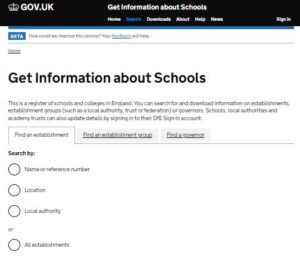This is especially true when a child is moving from primary to secondary school or from mainstream to a special school. It’s a big decision and you probably won’t know whether you’ve made the right one until your child is there and has had a chance to settle in.
We’re an impartial service, so we can’t recommend specific schools. But we can help you ask useful questions, know what to look for and understand what might be best for your child.
We also have some top tips, questions to ask and a school comparison chart, to help you when you’re planning, going on school visits or talking to staff.

![]() Legally, a school can’t refuse to admit any child with special educational needs because they don’t feel able to cater for those needs.
Legally, a school can’t refuse to admit any child with special educational needs because they don’t feel able to cater for those needs.
If your child has special educational needs, they’re at a state school and they don’t have an Education, Health and Care (EHC) plan, they must go to a mainstream school (they can’t go to a special school).
If your child has an EHC plan, they can go to a mainstream or a special school. Only children who have an EHC plan can go to a special school.
Every school has to produce an SEN information report, which is published on their website. The report must have information about the kinds of special educational needs supported at the school, how support might be made for them and how effective that support is.
Mainstream and special schools offer quite different learning environments for a child. You can find out more about this in the sections below.
Your knowledge and experience of your child – their personality, abilities, challenges and triggers – are vital in helping to decide what school is best for them. Working together in partnership with professionals should give you the best chance of finding a school that’s the best ‘fit’ for your child.
All children have a right to be educated in a mainstream school, including those with an EHC plan. The local authority can only say no to a child with an EHC plan going to a mainstream school if it
You can find out more about this on the IPSEA website.
You can ask for a place at a school for your child, but your child may not necessarily get a place there, nor be entitled to free school transport to and from that school. It’s really important to check, before you make any firm decisions. If your child isn’t entitled to school transport then you will have to find a way to get them there and back every day. You can find out more about transport on the Devon.gov.uk website.
This is a difficult question to answer in a specific way, because every child is different, and every family has different needs and preferences. You’ll need to work out what your priorities are and what will work best for you and your child. You know your child better than anyone else, so you’ll know what they can manage and what will help them achieve their best.
 These are some of the things to think about:
These are some of the things to think about:
When you’re thinking about the kind of school that might best suit your child, it’s a good idea to get some other views. The most important of these is your child’s views. You can also talk to the following people about the kind of environment that might best help them to learn:
Have a look at your child’s nursery or school plan or EHC plan too, and make sure you’re really familiar with what they’re going to need in any school they go to.
There are several different types of school. These are the main options.
Mainstream schools
 This is the type of school that most children and young people go to. This group includes community and faith schools, academies and grammar schools. The schools are funded by the local authority or directly by government, depending on the kind of school they are.
This is the type of school that most children and young people go to. This group includes community and faith schools, academies and grammar schools. The schools are funded by the local authority or directly by government, depending on the kind of school they are.
Children and young people with and without additional needs go to mainstream schools. Children with and without an EHC plan can go to a mainstream school.
Mainstream schools teach to a national curriculum of subjects, but secondary schools can also specialise in specific subject areas, such as arts, sport or technology. They should also support children with health conditions – for example with managing medication, personal care, or toileting.
Special schools
Special schools are only for children and a young people with special educational needs. Children and young people with Education Health and Care (EHC) plans are the only ones who can go there. Around four out of every 10 children with an EHC plan go to special school.
 Special schools follow the national curriculum as far as possible, but they can and do differentiate. That means they teach to meet the needs and ability levels of each child or young person. They also give life skills-based learning too. Some special schools may offer GCSEs to foundation level only, and tend to offer a more limited range of subjects.
Special schools follow the national curriculum as far as possible, but they can and do differentiate. That means they teach to meet the needs and ability levels of each child or young person. They also give life skills-based learning too. Some special schools may offer GCSEs to foundation level only, and tend to offer a more limited range of subjects.
Non-maintained special schools are special schools run privately or by charities. Some of these are residential. A few children with an EHC plan may be able to go to one of these schools, where it has been clearly shown that no local school can meet their needs.
Some special schools for children over 11 are specifically for those with a particular difficulty, such as communication or social emotional and mental health needs. Some take a particular approach to support, such as being trauma informed. In other schools, most students will have a particular condition, such as autism. Some special schools are for children and young people with moderate or severe learning disabilities who can have a wide range of needs.
The designation of school, of the type of SEND they mainly support, can make quite a lot of difference for a child. It’s worthwhile reading a school’s website and talking to staff as well, to get a good idea of the needs of their students and whether your child is likely to thrive there. You can find out more about special schools in Devon on the Local Offer website.
A resource base or specialist unit
These are small specialist units based in mainstream schools. There are usually around 8 – 12 children in each unit. Teachers and staff in resource bases directly teach children, but they also support staff in other schools to help the children they teach. This is called outreach work.
Resource base places are only given to children with an EHC plan. There are several units in Devon that support children with communication and interaction needs, such as children with autism. There are also two resource bases for children with social, emotional and mental health needs. You can find out more about these on Devon’s Local offer.
Independent
Independent (private) schools charge fees for a child to go there, instead of being funded by the government. Children and young people who go there don’t have to follow the national curriculum and local authorities and government have no control over how they are run.
Some independent schools have children with special educational needs and local authorities place a few children with EHC plans in this kind of school – where it has been clearly shown that no local school can meet their needs. There is a list of independent schools that are approved for children with SEN, called Section 41. You can find the list on the gov.uk website. You can select just the Devon schools from the list.
Residential special schools
Residential special schools care for children with complex special educational needs and/or disabilities (SEND). Children can stay there all day and if they need to.
Elective Home Education (EHE)
This is where you educate your child at home or in another way that you choose, rather than sending them to school. You can find out more about home education in our guide.
Education Otherwise Than at School (EOTAS)
EOTAS is for children and young people with an EHC plan who, for whatever reason, can’t go to a mainstream or specialist school.
This type of education is highly individual for each child and often includes more than one alternative education provider, such as mentoring services, forest school or skills-based learning. It’s used when a child can’t manage in school, for example if they have severe mental health difficulties or when the schools they have been at haven’t been able to meet their specific needs.
This can be a complex area, so if you need more advice about it, please contact us.
Mainstream | Special |
Education for all children, including those with SEND and medical conditions. | Education only for children with SEND. |
Usually follows the national curriculum of subjects, though for children with SEN there is usually some flexibility. | Can be a highly individual curriculum for each child. |
Larger class sizes and generally more pupils in the whole school, compared to a special school. | Usually, smaller class sizes and a smaller school size. |
Low staff to child ratio – for example, one teacher for every 25-30 students. | High staff to child ratio – for example, one teacher for every five students. |
Usually, teachers are trained around subject areas, such as maths and English | Teachers and support staff are specially trained in SEN. |
Most children in mainstream school have a level of academic ability which will enable them to take GCSEs. | There can be a wide range of ability and need in some special schools and classes. That means a child’s peers may have very different abilities, needs and behaviour. |
There is usually a wide range of subject options available and a full curriculum. | There may be a smaller range of subjects available to study at GCSE level and some schools may not follow the full curriculum. |
Some specialist support may come from within the school’s staff, but most will come from outside. | May have speech therapists, occupational therapists or other professionals based within the school who work closely with teaching staff. |
There may be specialist facilities, but these are more likely to be based around subjects taught and the curriculum. Some mainstream buildings have been adapted to meet the needs of disabled and SEN students, but some have not. | There may be specialist facilities such as computer software and play equipment, and the building itself is likely to have been specifically designed for example, a wheelchair accessible layout. |
For some children, this is a really clear choice. If your child doesn’t have an EHC plan, has managed well in a mainstream school with a few adjustments and some extra support, then a mainstream school is likely to be the right setting for them. Or, if they have an EHC plan, complex needs and need a lot of adult and specialist support, a special school will be the obvious choice.
 But for many parents, the choice isn’t so clear-cut. Lots of parents think about the best setting for their child and for every family, what they consider and how they make their decision is different.
But for many parents, the choice isn’t so clear-cut. Lots of parents think about the best setting for their child and for every family, what they consider and how they make their decision is different.
If things aren’t going well in a mainstream school, it can be natural to think the next step is a special school place. Sometimes this is the case, but not always. The best fit for a child will be whatever school can best meet their needs. If things aren’t working as well as they could or should, it’s worth thinking about whether they’re getting the support that’s in their plan, or whether their needs aren’t clear. Sometimes a review of their plan, further assessment or specialist advice can make all the difference. Contact us if you need more advice.
These are some of the times when families might consider whether mainstream or special school is the better choice for their child:
It’s worth remembering too, that mainstream schools can sometimes offer quite different environments and approaches too. So, it’s not always a choice between mainstream and special. One mainstream school may actually be able to meet your child’s needs in a better way than another mainstream school. Very occasionally, for some children with an EHC plan, a small independent school, could also be a choice.
It’s important to always come back to your child’s needs and what best meets those, rather than focusing solely on the type of school.
Important to know
The reality is, there is a lot of demand for special school places. Not every family that asks for a special school place for their child will get one. That can be a difficult thing to be told, and many parents find it extremely worrying and unsettling for their child. You can challenge that decision by talking directly to the SEN 0-25 team, by going to mediation or through the SEND tribunal process. If you’re in this situation, you can talk to us for advice about your options.
It’s worth remembering that many children with an EHC plan can and do manage well in mainstream school – with individual curriculums, specialist support and a flexible and creative approach from staff. Some have bespoke and highly individual support. Remember too that EHC plans are reviewed at least once a year. If things aren’t going well in mainstream, the type of school can be reconsidered – it’s not a once only opportunity.
 There is a Government database that lists all schools and colleges in England. You can search it by local authority and if you put Devon into the search function it will create an A-Z list of all schools and colleges in the county. You can then use the filters on the search to narrow the list down. You can add a filter for different types of school, including independent and special schools.
There is a Government database that lists all schools and colleges in England. You can search it by local authority and if you put Devon into the search function it will create an A-Z list of all schools and colleges in the county. You can then use the filters on the search to narrow the list down. You can add a filter for different types of school, including independent and special schools.
For example, you can start your search by choosing ‘Devon’ and then narrow the results down by choosing ‘secondary’ or ‘Special’. You can then search again for ‘Devon’ and ‘independent’ (these are not always special schools, but often have smaller classes) or ‘free schools’, or ‘Local Authority Maintained Schools’ or ‘Academies’. If you live near a county border you can also search in Cornwall, Dorset, Plymouth, Torbay or Somerset.
Devon County Council also has a directory of schools. This works in a similar way to the Government database, in that you can narrow your search using filters to make it more useful. On the Devon database you can search by area of the county, academy trusts and learning communities. You can also do a search for special schools.
You apply for a mainstream school place through Devon school admissions. That means you choose where you would like your child to go to school. Then you fill out an application form saying which school you want. There are two main types of admissions:
There is more information about applying for a mainstream place and what to do if you don’t get the place you want, on the Devon school admissions web pages.
If you’re applying for a place at special school, or a resource base, the process is a bit different. You can find out more below.
If your child has an EHC plan, then as their parent you can ask for any school that you want them to go to, which you believe will best suit their needs. This is called ‘parental preference’. But the local authority doesn’t have to go with your choice and they don’t have to name it on the final EHC plan.
You can ask for a specific school:
You, or your young person if they are over 16, can ask for any of the following types of school or college:
When you’ve named the school you want, the local authority usually talks to the school, college or other educational setting to see if they can meet your child’s needs. They will also talk to any possible alternative schools, colleges or settings they think might be able to meet the needs of your child. This is called consulting with a school or a ‘consult’.
You can find out more about this in our Top Tips for finding and choosing a school. You may also find it helpful to read guidance written by IPSEA which explains the process in more detail.
Page reviewed: April 2024
Page due for review: April 2026
DiAS (Devon, Information, Advice and Support) supports children and young people aged 0-25 with special educational needs and disabilities (SEND), and their parents and carers.
Helpful links
Contact us
Legal
© 2025 Devon Information Advice & Support
Searching...